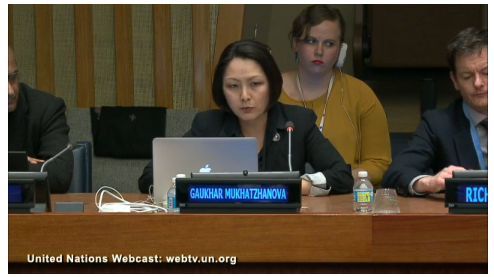
At a time when nuclear risks are heightened, the crisis in arms control is deep and the threat of a new arms race looms, the entry into force of the Treaty on the Prohibition of Nuclear Weapons (TPNW) offers hope. This was the message that Gaukhar Mukhatzhanova, Director of the International Organizations and Nonproliferation Program, imparted at the beginning of her remarks at a high-level event to commemorate the TPNW's entry into force. The event was organised by the Permanent Missions of Austria, Brazil, Costa Rica, Indonesia, Ireland, Mexico, New Zealand, Nigeria, South Africa and Thailand in Geneva, New York and Vienna to the United Nations.
Ms. Mukhatzhanova joined other featured speakers, including Minister of Foreign and Religious Affairs of Costa Rica Rodolfo Solano Quirós, United Nations Secretary-General Antonio Guterres, President of the International Committee of the Red Cross Peter Maurer, Executive Director of the International Campaign to Abolish Nuclear Weapons Beatrice Fihn and Setsuko Thurlow – a representative of the Hibakusha, the survivors of the atomic bombings of Hiroshima and Nagasaki.
During her remarks, Ms. Mukhatzhanova reminded participants of the origins of the TPNW. It is a product of the Humanitarian Initiative, which sought to reframe the debate on nuclear weapons, to focus on their impact on individuals, communities and the environment, rather than on strategic stability. The TPNW, she said, was born of the conviction that nuclear weapons are too inhumane to be used against anyone, under any circumstances. In addition, the TPNW represents a movement by many non-nuclear-weapon States to "reclaim their ownership of the issue" and "their place in the debate" on nuclear weapons.
Ms. Mukhatzhanova, noting that nuclear-weapon States universally oppose the TPNW, reminded that the treaty is now a part of the international non-proliferation and disarmament regime. States' positions are not set in stone, she observed, as some States that once opposed the Treaty on the Non-Proliferation of Nuclear Weapons (NPT) are now among the NPT's staunch supporters. Positions may be difficult to change, but not impossible.
As the number of States Parties to the TPNW grows, so will its normative impact. And while the nuclear-weapon States will not join the TPNW today or tomorrow, Ms. Mukhatzhanova asserted that by challenging the legitimacy of continued possession of nuclear weapons, the treaty will put pressure on the nuclear-weapon States to act on their disarmament commitments, to implement the steps and actions negotiated in good faith in the context of the NPT.
In closing, Ms. Mukhatzhanova acknowledged that there is work ahead for parties to the TPNW, as they prepare for the first meeting of TPNW States Parties. She wished them every success and extended her congratulations.
